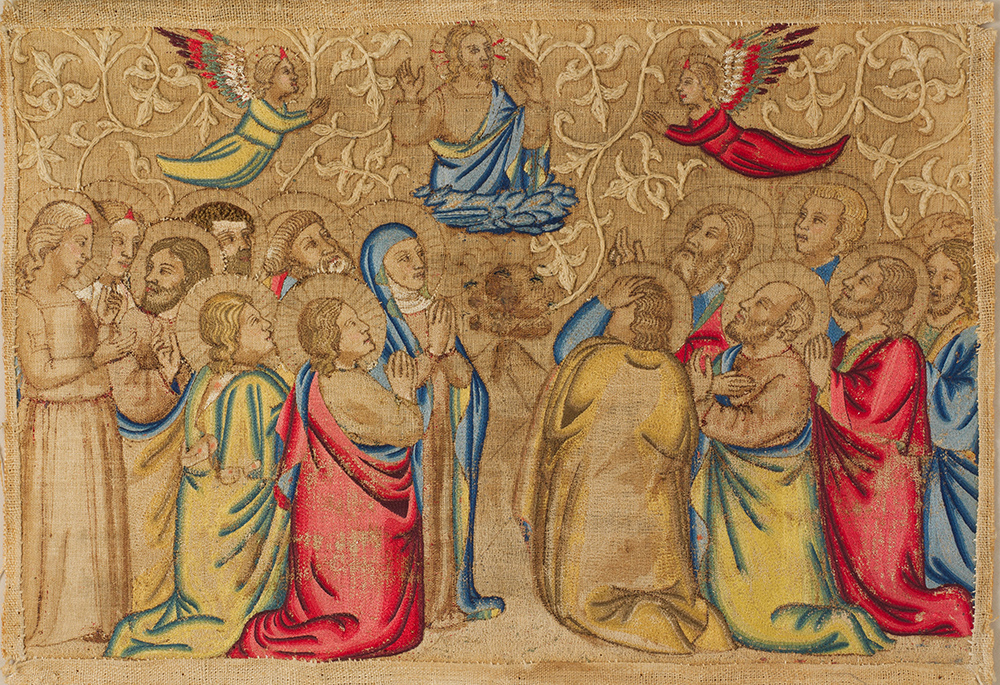
"The Ascension," a 14th-century embroidery made in Florence, Italy (Metropolitan Museum of Art)
Many New Testament stories appear to be variations of one another with minor adjustments. Not so Jesus' ascension. What the different accounts have in common is that Christ appeared among his disciples and missioned them to continue his work. (In the Gospel stories, Mary Magdalene is the only person Christ appeared to individually.)
According to John, Jesus appeared three times, commissioning the disciples to forgive and instructing Peter to feed his sheep. John mentions no ascension. Matthew describes how Jesus called the disciples to a mountaintop from where he sent them to spread the Gospel to the whole world and to baptize and pledged to remain with them until the end of time. Luke ends his Gospel with Jesus departing from Bethany, telling the disciples to remain in Jerusalem until the promise of the Father would fall on them. In the Acts of the Apostles, the second volume of his Gospel, Luke begins where he left off, narrating the departure and presence of the risen Lord with more detail than anywhere else.
According to most scholars, Mark ended his Gospel with verse 16:8, saying that the women fled from the empty tomb and said nothing to anyone because they were afraid. Mark apparently ended this way to provoke his community. Writing around the year 70, not long after Peter's martyrdom, Mark's audience knew persecution and had reason to be frightened. Mark wanted to jolt them beyond their fear. Mark's community knew that the women really did spread the word; the Gospel was being preached. Still, Mark was warning the community that if they remained afraid or used any other excuse to avoid giving witness to the risen Lord, the message would disappear.
Unsatisfied with Mark's disappointing ending, later scribes wrote more "adequate" conclusions and added some spectacular signs among those who preached the Gospel message. We hear this version today.
Examining Luke's account of the Ascension in Acts, we note that before saying that Jesus promised the disciples that they would be baptized in the Holy Spirit, he gave his followers "instructions through the Holy Spirit." Then, as he was about to be taken up, Jesus again promised, "You will receive power when the Holy Spirit comes upon you."
Throughout his Gospel, Luke mentions the Spirit no fewer than 15 times. Luke depicts the Spirit's presence from the moment an angel announced the birth of John the Baptist through Jesus' ministry and beyond. Luke presents the reception of the Spirit at Pentecost as the apex, not the first or last activity of the Spirit among Jesus' disciples. For Luke, the Spirit's presence in and to the disciples is a process, not a once-for-all event.
Advertisement
In his Letter to the Ephesians, Paul gives helpful ideas about the Spirit-power the disciples received. Paul teaches that the power to carry out Christ's mission bestows wisdom, revelation, knowledge of Christ, enlightenment, hope, and a share in the riches of Christ's glory. For Paul, these qualities summarize the effects of following Christ and sharing his Spirit.
No matter how they depict it, each Gospel proclaims that the risen Christ made himself present to his disciples and handed over his mission with the promise that they would have the grace and strength to carry it out. This tells us that the feast of the Ascension is not about absence, but mission.
The feast of the Ascension is not about absence, but mission.
Luke's narrative shows that the Spirit of God was uniquely active even before the angel gave Mary the mission to be Mother of God and continues working in all who are willing to let Christ become present through them. The feast of the Ascension commissions Christ's followers through all ages, reminding us that Christ's mission continues through us and that the grace to accomplish it remains ever available to us. This is the point Luke made by saying that Jesus instructed the disciples to wait for the Holy Spirit. They knew the Spirit's presence, but needed to grow in it as they started to do what Jesus did.
We might note that the message of the Ascension is particularly apt as we participate in the synod on synodality. Jesus gives us his mission, and also the Spirit that empowers us to accomplish it. Like the disciples sent to wait in Jerusalem, instead of planning and carrying out what we think is right, our times call us to listen to the Spirit Christ bestows on all disciples.
The Spirit of Christ calls forth an innumerable variety of expressions of Christ's mission. To the extent that we are open, the Spirit will keep awakening us to the richness discoverable only in a community of believers on mission.
